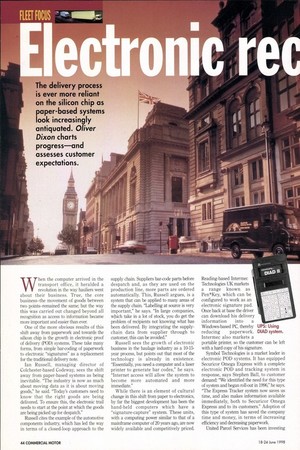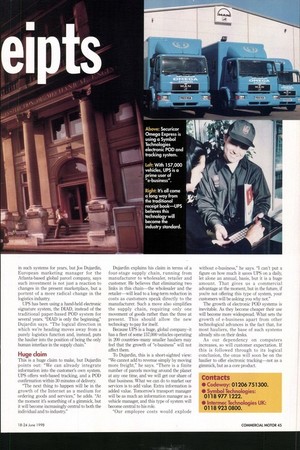The delivery process is ever more reliant on the silicon
Page 46

Page 47

If you've noticed an error in this article please click here to report it so we can fix it.
chip as paper-based systems look increasingly antiquated. Oliver Dixon charts progress—and assesses customer expectations.
When the computer arrived in the transport office, it heralded a revolution in the way hauliers went about their business. True, the core business—the movement of goods between two points—remained the same; but the way this was carried out changed beyond all recognition as access to information became more important and easier than ever.
One of the more obvious results of this shift away from paperwork and towards the silicon chip is the growth in electronic proof of delivery (POD) systems These take many forms, from simple bar-coding of paperwork to electronic "signatures" as a replacement for the traditional delivery note.
Ian Russell, managing director of Colchester-based Codeway, sees the shift away from paper-based systems as being inevitable. "The industry is now as much about moving data as it is about moving goods," he said. "Today's customers need to know that the right goods are being delivered. To ensure this, the electronic trail needs to start at the point at which the goods are being picked up for despatch."
Russell cites the example of the automotive components industry, which has led the way in terms of a closed-loop approach to the supply chain. Suppliers bar-code parts before despatch and, as they are used on the production line, more parts are ordered automatically. This, Russell argues, is a system that can be applied to many areas of the supply chain. "Labelling at source is very important," he says. "In large companies, which take in a lot of stock, you do get the problem of recipients not knowing what has been delivered. By integrating the supplychain data from supplier through to customer, this can be avoided."
Russell sees the growth of electronic business in the haulage industry as a 10-15year process, but points out that most of the technology is already in existence. "Essentially, you need a computer and a laser printer to generate bar codes," he says. "Internet access will allow the system to become more automated and more immediate."
While there is an element of cultural change in this shift from paper to electronics, by far the biggest development has been the hand-held computers which have a "signature-capture" system. These units, with a computing power similar to that of a mainframe computer of 20 years ago, are now widely available and competitively priced. Reading-based Intermec Technologies UK markets a range known as Pen*Key, which can be configured to work as an electronic signature pad. Once back at base the driver can download his delivery information into a Windows-based PC, thereby UPS: Using portable printer, so the customer can be left with a hard copy of his signature.
Symbol Technologies is a market leader in electronic POD systems. It has equipped Securicor Omega Express with a complete electronic POD and tracking system in response, says Stephen Ball, to customer demand: "We identified the need for this type of system and began roll-out in 1996," he says. "The Express Tracker system now saves us time, and also makes information available immediately, both to Securicor Omega Express and to its customers." Adoption of this type of system has saved the company time and money, in terms of increasing efficiency and decreasing paperwork.
United Parcel Services has been investing in such systems for years, but Jos Dujardin, European marketing manager for the Atlanta-based global parcel company, says such investment is not just a reaction to changes in the present marketplace, but a portent of a more radical change in the logistics industry.
UPS has been using a hand-held electronic signature system, the DIAD, instead of the traditional paper-based POD system for several years. "DIAD is only the beginning," Dujardin says. "The logical direction in which we're heading moves away from a purely logistics function and, instead, puts the haulier into the position of being the only human interface in the supply chain."
Huge claim This is a huge claim to make, but Dujardin points out: "We can already integrate information into the customer's own system. UPS offers web-based tracking, and a POD confirmation within 30 minutes of delivery.
"The next thing to happen will be in the growth of the Internet as a medium for ordering goods and services," he adds. "At the moment it's something of a gimmick, but it will become increasingly central to both the individual and to industry" Dujardin explains his claim in terms of a four-stage supply chain, running from manufacturer to wholesaler, retailer and customer. He believes that eliminating two links in this chain—the wholesaler and the retailer—will lead to a long-term reduction in costs as customers speak directly to the manufacturer. Such a move also simplifies the supply chain, requiring only one movement of goods rather than the three at present. This should allow the new technology to pay for itself.
Because UPS is a huge, global company–it has a fleet of some 157,000 vehicles operating in 200 countries–many smaller hauliers may feel that the growth of "e-business" will not affect them.
To Dujardin, this is a short-sighted view: "We cannot add to revenue simply by moving more freight," he says. "There is a finite number of parcels moving around the planet at any one time, and we will get our share of that business. What we can do to market our services is to add value. Extra information is added value. Tomorrow's transport manager will be as much an information manager as a vehicle manager, and this type of system will become central to his role.
"Our employee costs would explode without e-business," he says. "I can't put a figure on how much it saves UPS on a daily, let alone an annual, basis, but it is a huge amount. That gives us a commercial advantage at the moment, but in the future, if you're not offering this type of system, your customers will be asking you why not."
The growth of electronic POD systems is inevitable. As they become cheaper their use will become more widespread. What sets the growth of e-business apart from other technological advances is the fact that, for most hauliers, the base of such systems already sits on their desks.
As our dependency on computers increases, so will customer expectation. If this is followed through to its logical conclusion, the onus will soon be on the haulier to offer electronic tracking—not as a gimmick, but as a core product.
Contacts • Codeway: 01206 751300.
• Symbol Technologies: 0118 977 1222.
• Intermec Technologies UK: 0118 923 0800.




















































































































